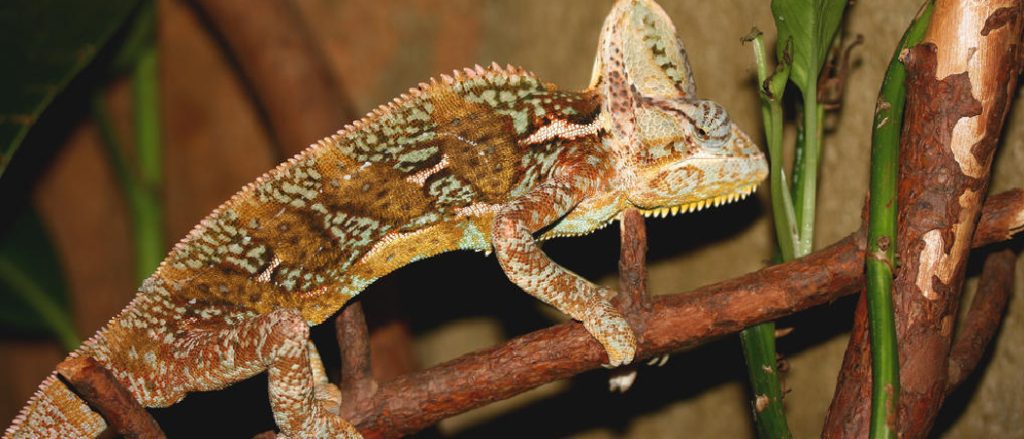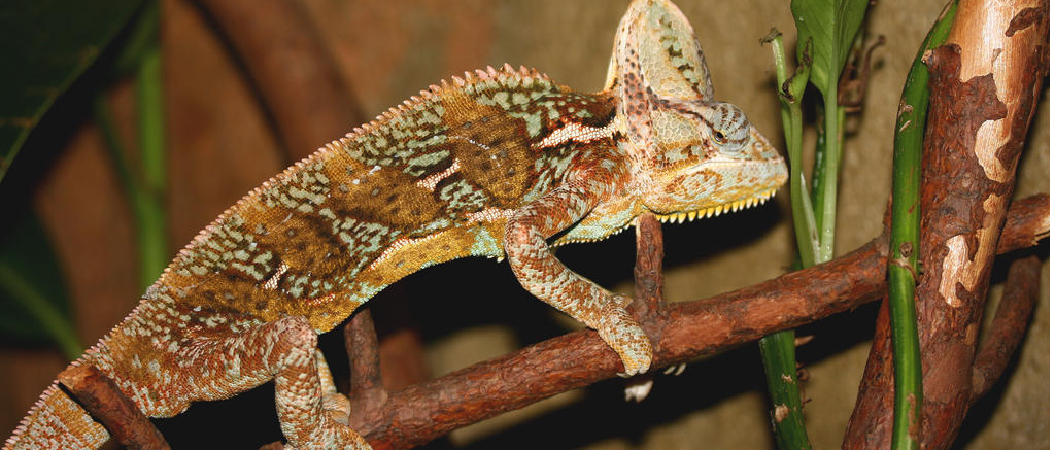If your chameleon is dying, common signs include loss of appetite, lethargy, and changes in coloration. Chameleons are intriguing reptiles known for their ability to change color and blend into their surroundings.

However, they can also be delicate and susceptible to health issues. As a responsible pet owner, it is crucial to monitor your chameleon’s behavior and appearance to ensure their well-being. When you notice signs such as loss of appetite, unusual lethargy, and changes in coloration, it may indicate that your chameleon is experiencing health problems and could be in a critical condition.
Understanding these symptoms and seeking timely veterinary care can greatly impact your chameleon’s chances of recovery. We will explore in detail how to identify if your chameleon is dying and what steps you can take to address the situation.

Credit: m.youtube.com
Signs Of A Dying Chameleon
Chameleons displaying a loss of appetite, sluggish movement, sunken eyes, and discoloration may be showing signs of a life-threatening condition. It is important to monitor their hydration, body weight, and behavior for any changes, and seek veterinary care if necessary.
Signs of a Dying Chameleon Chameleons are fascinating creatures known for their unique ability to change colors and adapt to their surroundings. However, like any other living being, chameleons are susceptible to illnesses and health issues. As a responsible chameleon owner, it is crucial to be aware of the signs that may indicate your beloved pet is in distress. In this section, we will explore the physical symptoms and behavioral changes that could be possible indicators of a dying chameleon.
Physical Symptoms
When it comes to determining the health of your chameleon, paying close attention to physical symptoms is vital. Here are some common physical signs that might suggest your chameleon is in poor health: 1. Weight Loss: Noticeable weight loss or a visibly emaciated appearance can indicate a decline in your chameleon’s overall wellbeing. This could be attributed to various health issues, including inadequate nutrition or an underlying illness. 2. Discolored Skin: Chameleons are renowned for their ability to change color, but abnormal discoloration might be a sign of something more serious. Darkened or pale skin could suggest dehydration or even an infection. 3. Sunken Eyes: A healthy chameleon should have bright, alert eyes. If you notice your chameleon’s eyes appearing sunken or dull, it may indicate dehydration, malnutrition, or an underlying illness. 4. Loss of Appetite: Chameleons are generally known to have varied appetites. However, a sudden loss of interest in food or refusing to eat altogether for an extended period could be a red flag indicating health issues. 5. Labored Breathing: Difficulty in breathing or wheezing can be a clear sign that your chameleon is struggling and may require immediate medical attention. Respiratory problems can be caused by infections or other serious ailments. 6. Unusual Lumps or Bumps: If you notice any abnormal growths, particularly around the mouth, limbs, or body of your chameleon, it is important to have them examined by a reptile veterinarian. These growths could be tumors or abscesses that require professional treatment.
Behavioral Changes
In addition to physical symptoms, changes in your chameleon’s behavior can provide valuable insights into their health status. Here are some behavioral changes that may indicate your chameleon is unwell: 1. Lethargy: Chameleons are typically active reptiles. If your chameleon becomes unusually lethargic, spending most of its time perched motionless or remaining at the bottom of the enclosure, it could suggest an underlying health issue. 2. Aggression or Irritability: Noticeable aggression or a sudden change in temperament, such as biting or hissing, may signify that your chameleon is in pain or distress. This change in behavior could be a result of an underlying health problem. 3. Decreased Grip Strength: Chameleons rely on their strong grip to navigate their environment. If you notice a noticeable decrease in your chameleon’s grip strength or difficulty climbing, it could indicate muscle weakness or other health conditions. 4. Tail Drooping: The tail of a healthy chameleon is usually held upright. However, if you observe your chameleon’s tail hanging limply or dragging on the ground, it could be a sign of dehydration, metabolic bone disease, or another serious health issue. 5. Unresponsiveness to Environmental Stimuli: Chameleons are known for their ability to blend into their surroundings and respond to external stimuli. If your chameleon seems unresponsive to touch, changes in light or temperature, it could suggest a decline in their overall health and well-being. Monitoring your chameleon’s physical symptoms and behavioral changes is essential in maintaining its health and well-being. If you observe any of the signs mentioned above, it is crucial to consult a reptile veterinarian promptly. Remember, early detection and proactive care can significantly increase the chances of successful treatment and recovery for your beloved chameleon.

Credit: www.reddit.com
Physical Symptoms Of A Dying Chameleon
As responsible pet owners, it’s crucial to be vigilant about our chameleon’s health. Recognizing the signs of illness or distress can help us take prompt action and potentially save our beloved reptile’s life. In this section, we will discuss the physical symptoms that may indicate a chameleon is nearing the end of their life.
Loss Of Appetite
One of the first signs that something is amiss with our chameleon is a sudden loss of appetite. If you have noticed a significant decline in your chameleon’s food consumption, it may indicate an underlying health issue. Chameleons are known for their voracious appetites, so any notable change in their eating patterns should be cause for concern.
Weight Loss
A noticeable drop in the chameleon’s weight can be a clear indication that they are not getting the nutrients they need to thrive. Regular monitoring of your chameleon’s weight is essential to ensure they are maintaining a healthy size. If you observe a significant decrease in their weight, it is crucial to address the issue as soon as possible.
Abnormal Body Coloration
Chameleons are known for their ability to change color to match their surroundings. However, if you notice any abnormal or inconsistent changes in your chameleon’s coloration, it could be a sign of distress. Pay close attention to any variations in the intensity, brightness, or pattern of their skin, as these changes can indicate a grave health problem.
Lethargy And Weakness
A chameleon that is dying may become increasingly lethargic and show signs of weakness. They may struggle to move or even fail to venture out of their hiding spot. If you notice a lack of energy or abnormal behavior in your chameleon, it is crucial to seek veterinary attention promptly.
Difficulty Breathing
Difficulties in breathing are a serious concern and may be an indication that your chameleon is nearing the end of their life. Labored breathing, wheezing, or gasping for air should never be ignored. Rapid respiratory distress can be caused by various factors, such as respiratory infections or other underlying health issues, and requires immediate medical attention.
Sunken Eyes
The condition of a chameleon’s eyes can tell us a lot about their overall health. Sunken or deeply recessed eyes may be indicative of dehydration or nutritional deficiencies. If your chameleon’s eyes appear sunken, it is crucial to provide them with immediate care and consult a veterinarian.
Being aware of these physical symptoms can help us identify when our chameleon is in distress or nearing the end of their life. Remember, the well-being of our reptile companions depends on our ability to recognize and address potential health issues promptly.
Behavioral Changes In A Dying Chameleon
When it comes to our pets, understanding their behaviors is crucial in detecting any health issues they might be facing. In the case of chameleons, these unique reptiles have their own way of communicating distress. By being aware of the various behavioral changes that can occur in a dying chameleon, you can provide the necessary care and seek immediate veterinary attention if needed.
Decreased Or Unusual Movement
One of the first signs that something might be wrong with your chameleon is a noticeable decrease in movement. These usually active creatures may become lethargic, spending more time perched and less time exploring their surroundings. Keep a close eye on their activity levels and if you notice a significant decrease, it’s important to take action.
Excessive Sleepiness
Chameleons are known for their ability to change color and blend in with their environment. However, if you notice your chameleon sleeping more than usual or appearing drowsy throughout the day, it could be a sign of underlying health issues. Excessive sleepiness can be an indicator of a dying chameleon, so pay attention to any changes in their sleeping patterns.
Aggression Or Irritability
While it’s not uncommon for chameleons to display occasional aggression, an unusually aggressive or irritable demeanor could indicate a more serious problem. If your chameleon begins behaving aggressively towards you or other chameleons in their habitat, it may be a sign that they are in distress and need immediate attention.
Lack Of Interest In Surroundings
If you notice your chameleon showing a lack of interest in its surroundings, it’s crucial to investigate further. Chameleons are naturally curious creatures, constantly exploring and observing their environment. A dying chameleon may lose interest in their surroundings, appearing disinterested or detached from their usual activities.
Unresponsiveness To Stimuli
Another sign of a dying chameleon is their unresponsiveness to stimuli. Chameleons are typically highly sensitive to their environment and will react to changes in light, movement, or sound. However, if you observe that your chameleon is unresponsive to external stimuli, it could indicate that they are experiencing health issues that require immediate attention.
In conclusion, being aware of the behavioral changes in a dying chameleon can help you identify and address any potential health concerns. If you notice a combination of these signs or any other worrying behaviors, it is important to consult a reptile veterinarian as soon as possible to ensure the well-being of your chameleon.

Credit: www.petco.com
Frequently Asked Questions For How Do You Know If Your Chameleon Is Dying
How Can You Tell If A Chameleon Is Dying?
If a chameleon is refusing food, has sunken or dull eyes, displays lethargy or has difficulty breathing, it may be a sign of illness or dying. Other symptoms to watch for include weight loss, discolored skin, and changes in hydration.
It’s important to seek veterinary attention if you suspect your chameleon is dying.
What Are The Common Signs Of A Dying Chameleon?
Some common signs of a dying chameleon include loss of appetite, sunken eyes, weak or unable to grip branches, lethargy, and labored breathing. Additionally, changes in body color and poor hydration are also indicators that the chameleon is not well.
Proper care and immediate veterinary attention are crucial in such cases.
Why Do Chameleons Die Suddenly?
Sudden death in chameleons can be caused by various factors such as infections, respiratory issues, organ failure, parasites, nutritional deficiencies, or stress. It’s essential to provide a suitable habitat with the right temperature, humidity, and UV lighting, as well as regular check-ups with a veterinarian to minimize the risk of sudden death.
Conclusion
As chameleon owners, it is essential to be observant and knowledgeable about the signs that may indicate our beloved pets are not well. By understanding the common symptoms and behaviors associated with a chameleon that may be dying, we can take prompt action and provide them with the best possible care.
Remember to seek veterinary assistance if you notice any concerning signs, as early intervention can make all the difference in saving their lives. Stay vigilant and proactive in monitoring your chameleon’s health to ensure their longevity and well-being.


